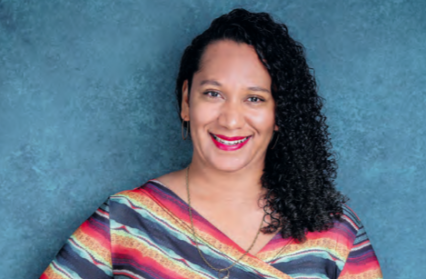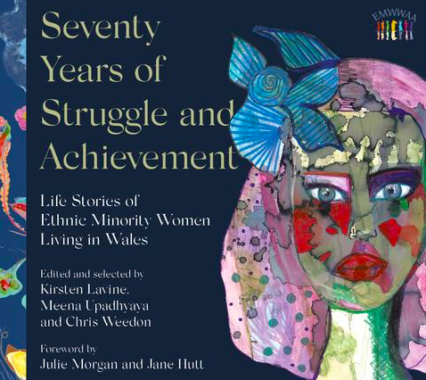With Parhtian’s upcoming publication – Seventy Years of Struggle and Achievement: Life Stories of Ethnic Minority Women Living in Wales – due to be released in October, Wales Arts Review is delighted to share an essay from Freelance Arts Consultant, Leanne Rahman, on the culture of creativity and the story of her personal history moving from Barbados to Wales in childhood.
A lot of my journey feels like it was by accident, but you have to grab an opportunity when it comes across your path. If it’s your burning desire to do something, then don’t let anybody tell you that you can’t. It’s going to be tough, but you’ve got to put your boxing gloves on and just go for it.
I was born in Barbados in 1975 and lived there until I was nine. My dad is from Barbados, and my mum is from Cardiff, though much of her family were originally from the Caribbean. As a child, I was a bit of a water baby and a good swimmer. Every day before and after school, I swam in the sea, and I told everyone I was going to be an Olympic swimmer. I also wanted to be a vet, as I loved animals. I used to rescue lots of injured animals from the beach and bring them home to nurse them back to health.
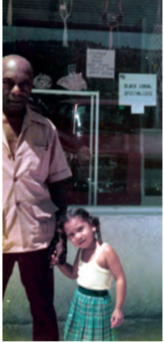
As I grew, my parents’ relationship began to break down, and shortly after my ninth birthday, my sisters and I left Barbados with my mum to live with my grandparents in Wales. I didn’t want to leave my dad or Barbados, but I was excited to come to the UK. We didn’t have any warm clothes, as they’re expensive to buy in the Caribbean, and when we arrived in November, the cold literally pierced our bones. Everything looked so grey in comparison to the Caribbean, where everything is so bright and vibrant, so I just thought, my God, there’s no colour here. It took a while for me to get used to it.
That winter was also the first time my sisters and I had ever seen snow. One morning, after there had been a heavy snowfall overnight, we bounded through the door barefoot and in our pyjamas and threw ourselves into the snow. We were covered like snow angels, laughing and screaming like fools. It took us about ten minutes to realise that snow actually makes you cold and wet, so we stood there sopping wet and shivering, but we just had to experience it to the fullest.
It’s strange when you first come to a new place and have to interact with new people. Understanding the lingo had me upside down for a long time, and it took me what felt like an eternity to understand what anybody was saying. But my Caribbean accent disappeared pretty quickly within a couple of months, and I now feel that I speak 100 per cent like I’m from Cardiff.
I went to Mount Stuart Primary School in the Docks and was the pupil that was always half an hour late to school in the mornings, strolling in on Caribbean time. But it was amazing to go to a school that was so diverse, particularly compared to the lack of diversity I experienced in Barbados. Attending Mount Stuart was a very special experience, especially due to the headmistress, the late Mrs Betty Campbell MBE, who made all pupils feel welcome and valuable, regardless of their backgrounds or where they came from.
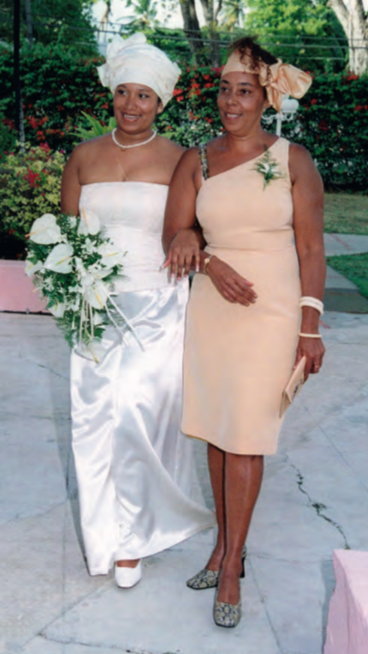
My mum raised me and my sisters as a single parent and worked extremely hard, holding down as many jobs as she could. During holiday periods, she couldn’t really be there to look after us, so we tried to enrol in as many summer schemes as possible. One of these was a filmmaking workshop for local youngsters run by the Black Film and Video Workshop in Wales, and I also volunteered for Butetown Carnival, delivering Caribbean dance workshops in schools. This is where my interest in the arts began, as I was inspired by the wealth of creativity within the local community.
Things weren’t as easy as they could have been, being female and from Butetown as well, where many young people have experienced this postcode being used against them. I was also quite young when I had my first child, which added another layer of difficulty and struggle. I was almost nine months’ pregnant, sitting my Alevel exams, and just managed to pass by the skin of my teeth. I remember a few of the teachers being really negative towards me, expecting and even advising me to drop out of school. I wouldn’t advise anyone to have a baby while studying because it’s really tough going mentally and physically, but if you’ve got a strong focus, determination and a good support network around you, you can achieve, no matter what.
After my son was born, I took a year out and then enrolled at Cardiff Met (then UWIC) and studied art and design. I carried out my work experience at BBC Wales and also with Red Flannel Films, a women’s filmmaking company that focused on women’s issues. After college, I got one of the last places in film school at UWCN’s Caerleon campus (now the University of South Wales). I was the first member of my family to attend university.
On graduating, I volunteered for the International Black Film Festival, Wales, for five years. Then I undertook various administrative jobs for local charities, who were doing great work, but I got to a point where I wanted to do something I felt was more meaningful. I got a position at Minority Ethnic Women’s Network, which was my first role as a support worker. The job entailed promoting access to green space for ethnic minority women and children in order to improve their health and wellbeing. It was a great role and really rewarding to see how the voluntary sector operated and how you could make a difference to people’s lives.
After a couple of years, I was approached by the Black Voluntary Sector Network (BVSNW) regarding an opening for a women’s arts development officer. The role aimed to increase the number of the agency’s female artists across Wales, particularly outside of Cardiff. It was an amazing opportunity for me, especially to do something hands-on once again within the creative industries.
During my time at BVSNW, I travelled a lot, meeting artists throughout Wales and identifying what the barriers were to them finding work and whether they felt that they faced any discrimination or prejudice when trying to gain employment. This information was fed back to the Arts Council of Wales, which aimed to increase fair and equitable opportunities for artists and creative professionals of colour.
We made some progress and some small steps forward. It was a huge amount of work for a very small team, but I really enjoyed it and was passionate about the work. Some of the artists I met were truly inspirational, and I worked on some fantastic community arts festivals and projects, helping to preserve cultural traditions while raising awareness among wider communities in Wales. It was heart-breaking when BVSNW closed around 2015. I was out of work for a time and decided to volunteer with Butetown History and Arts Centre. I also joined Voluntary Arts as an advisory panel member for Wales and worked on Tiger Bay Presents, a fringe festival at the Wales Millennium Centre.
Black History Month Wales is by far the largest and longest programme I was involved in over the past twelve years. The first event I co-organised with Nicky Delgado took place at Butetown Youth Club, and while it was small and a bit rough around the edges, it exceeded our expectations, and our local communities valued it. We were then asked to expand to include African diaspora people from other parts of Wales, enabling them to experience their cultural heritage and traditions. We also worked with teachers to create curriculum linked programmes that could be run in schools. I’m less involved with this work now, but it’s amazing to see the vital legacy that’s grown from such small beginnings.
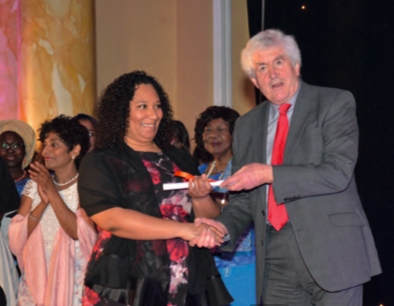
Education is for life, and having good teachers is something I feel very passionate about. If you keep bombarding young people with negativity, especially those from BAME and less affluent communities, continuously telling them that they’re not good enough or are not going to achieve, it’s so soul destroying and damaging to their development, as they grow up believing it. It makes me angry and upset, so I feel very fortunate that in some of the positions I’ve found myself in, I’ve been able to help young people.
I believe that knowledge and opportunities are for sharing. I’ve always been enthused by seeing people achieve their goals, maybe set up their own business, develop as a practising artist or just do whatever they aspire to do. The journey is very often not in a straight line, and a lot of mine feels like it was by accident, but you have to grab an opportunity when it comes across your path. We have to teach young people not to shy away from difficult things and not be too rigid in what they think the future holds for them. We all need to have more open minds in how we view achievement, failure and success. It’s in our nature to doubt ourselves and our abilities, but if it’s your burning desire to do something, then don’t let anybody tell you that you can’t. Only you can stop yourself from achieving your dream. It’s going to be tough, but you’ve got to put on your boxing gloves and just go for it.
My grandfather was an amazing role model in my life. He stowed away on a ship from St Lucia when he was thirteen and ended his journey in Tiger Bay. He stayed and married a Welsh lady, and they were married for 70 years before they passed away. I’d love to have the special kind of relationship that my nan and gramps had.
My mum has also been a massive inspiration to me and is my rock. I don’t think I would have been able to achieve half of what I’ve done in my life without somebody like her by my side. She’s had to overcome many hurdles, coming back from the Caribbean alone with three young children and starting life all over again. She’s always been so positive and active in the community and has instilled in me determination, courage and strength. I’ve also been really fortunate to have met such a good, loving and supportive man in my husband. We’ve been together for nearly 30 years now, and we have three wonderful children and one beautiful granddaughter.
I think every person needs strong personalities in their lives, the kind of characters that can really make a massive difference and help mould and support you. And if you’re unable to find that kind of role model close to home, we have to be able to provide a place where youngsters can get that kind of inspiration from, like at school or a local youth club. Meeting wonderful people along your journey opens your eyes to possibilities and endless opportunities, while you can also make friends, mentors and confidants on your way through life. I’m very fortunate to have been able to meet people who feel so passionately about community, culture and creativity, and who have enriched my life forever.
I was surprised to be nominated for an EMWWAA award in 2017 and to win in the category of Arts, Culture and Sports. Recognition for my work has never entered my mind whatsoever. For me, it’s always been about doing something in my community and in the arts that I love. I always prefer to be in the background, working hard to make things happen, as a convener to create opportunities for communities to access quality cultural activities and events.
A dream of mine would be to, one day, run my own arts centre. I feel we have lost quite a lot in the local community in terms of places where people can come together, express themselves creatively, eat good food and share stories. I could see myself being very happy and comfortable in a creative space just like this. Maybe in the future, I can make it happen.
Seventy Years of Struggle and Achievement is available to pre-order via Parthian.


